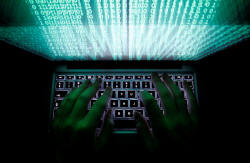|
U.S. boosting cyber
defenses, but not police presence, for election
 Send a link to a friend
Send a link to a friend
 [November 04, 2016]
By Julia Harte and Dustin Volz [November 04, 2016]
By Julia Harte and Dustin Volz
WASHINGTON
(Reuters) - Federal and state authorities are beefing up cyber defenses
against potential electronic attacks on voting systems ahead of U.S.
elections on Nov. 8, but taking few new steps to guard against possible
civil unrest or violence.
The threat of computer hacking and the potential for violent clashes is
darkening an already rancorous presidential race between Democrat
Hillary Clinton and Republican Donald Trump, amid fears that Russia or
other actors could spread political misinformation online or perhaps
tamper with voting.
To counter the cyber threat, all but two U.S. states have accepted help
from the U.S. Department of Homeland Security (DHS) to probe and scan
voter registration and election systems for vulnerabilities, a
department official told Reuters.
Ohio has asked a cyber protection unit of the National Guard, a reserve
force within the U.S. military, for assistance to protect the state's
systems.

On Thursday, Arizona Secretary of State Michele Reagan and her cyber
security team met with officials from the Federal Bureau of
Investigation (FBI) and the DHS, in addition to state-level agencies, to
discuss cyber threats, said Matt Roberts, a spokesman for Reagan.
Cyber security experts and U.S. officials say chances that a hack could
alter election outcomes are remote, in part because voting machines are
typically not connected to the internet.
But the FBI sent a flash alert in August to states after detecting
breaches in voter registration databases in Arizona and Illinois.
[nL1N1BA0OS]
ARMED GROUPS
Unidentified intelligence officials told NBC News on Thursday that there
is no specific warning about an Election Day attack, but they remain
concerned that hackers from Russia or elsewhere may try to disrupt the
process, likely by spreading misinformation by manipulating social media
sites such as Facebook and Twitter.
DHS cyber security experts plan to hold a media briefing on Friday to
discuss the agency’s efforts with states to boost the security of their
voting and election systems.
The potential for violence around the election has loomed in the
background of the campaign for months. Armed groups around the country
have pledged in unprecedented numbers to monitor voting sites for signs
of election fraud.
Voter intimidation reported at polling sites so far prompted Democrats
to accuse Trump of a "campaign of vigilante voter intimidation" in four
states on Monday. [nL1N1D11RE]
[to top of second column] |

A man types on a computer keyboard in this illustration picture
February 28, 2013. REUTERS/Kacper Pempel/Illustration/File Photo

But local authorities surveyed by Reuters on Thursday in five states -
Ohio, Pennsylvania, Arizona, Wisconsin and Florida - said they were not
increasing election-related law enforcement personnel or resources above
2012 levels.
'A LOT OF TALK, LITTLE ACTION'
The FBI, which designates one special agent from each of its 56 field
offices for election crime matters, has not increased its numbers or
given staff additional training this year, said an FBI spokeswoman.
There has been no "substantive change" in the number of personnel
deployed by the rest of the Justice Department, which designates
Assistant U.S. Attorneys and federal prosecutors within the agency's
Public Integrity Section to handle election crimes, according to a
spokesman.
Jim Pasco, executive director of the Fraternal Order of Police, which
represents hundreds of thousands of U.S. officers, said cops are taking
the same security measures they would take for any large event. He said
he expects the vows by militias to monitor the polls to be "a lot of
talk, little action."
Civil rights groups said deploying more police officers to the polls can
actually intimidate voters.

“The presence of law enforcement can have a chilling effect on the
electorate,” said Kristen Clarke, president of the Lawyers’ Committee
for Civil Rights Under Law, a watchdog group. “That’s something we want
to discourage.”
(Additional reporting by Andy Sullivan in Washington; Editing by Kevin
Drawbaugh and Bill Rigby)
[© 2016 Thomson Reuters. All rights
reserved.] Copyright 2016 Reuters. All rights reserved. This material may not be published,
broadcast, rewritten or redistributed. |